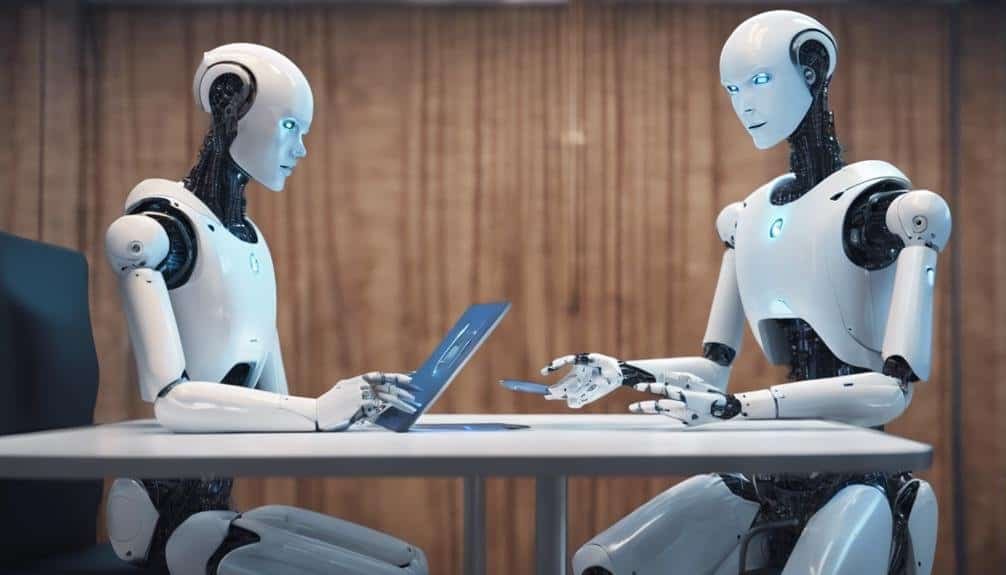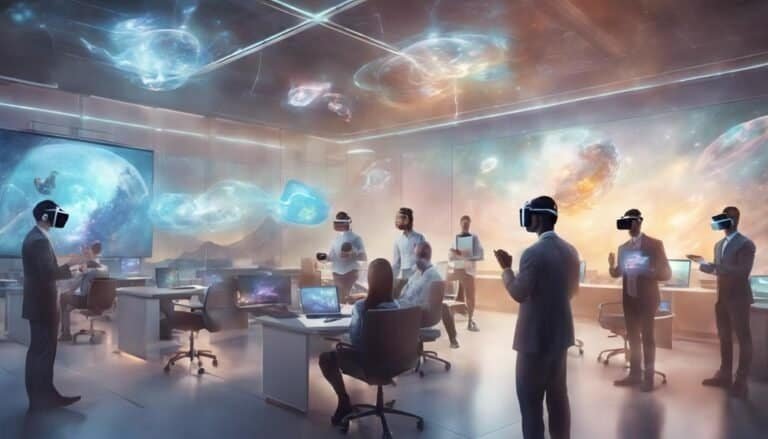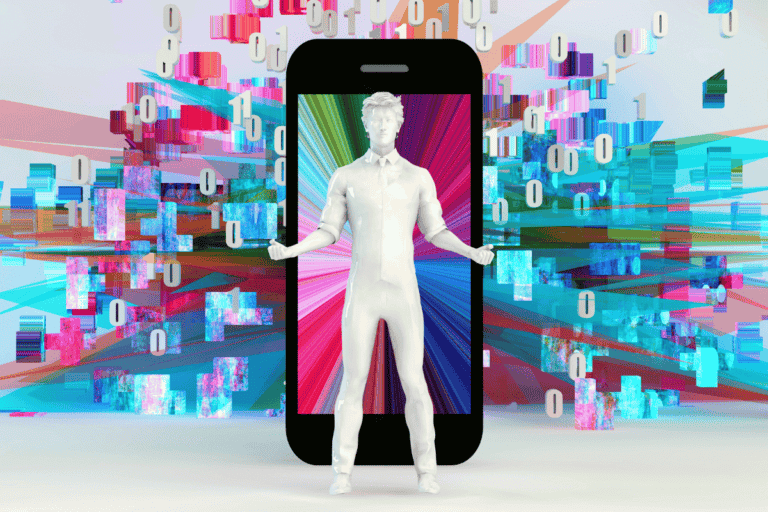AI in Talent Acquisition and HR: A Complete Introduction
Imagine AI as a compass guiding the ship of talent acquisition and HR through uncharted waters. As organizations navigate the evolving landscape of work, AI emerges as a powerful ally, reshaping how businesses attract, assess, and retain talent.
From streamlining recruitment processes to personalizing employee development, the impact of AI in HR is profound. But what lies beyond the horizon of AI's potential in talent acquisition and HR? Explore the transformative possibilities and challenges that AI brings to the realm of human resources in this comprehensive introduction.
Key Takeaways
- AI streamlines talent acquisition processes for efficient candidate selection.
- AI revolutionizes HR operations by automating tasks and reducing manual workload.
- AI optimizes recruitment strategies through automation and data-driven insights.
- AI enhances employee experience by boosting engagement, providing personalized development, and streamlining processes.
The Rise of AI in Talent Acquisition
In today's competitive job market, AI has emerged as a game-changing tool in streamlining and enhancing talent acquisition processes. AI algorithms play a pivotal role in revolutionizing talent sourcing strategies. These algorithms can analyze vast amounts of data to identify top candidates efficiently, saving time and resources for HR professionals. By utilizing AI algorithms in talent sourcing, organizations can enhance the accuracy of candidate matching, leading to better hiring decisions and improved retention rates.
AI algorithms are designed to sift through resumes, social media profiles, and other sources to identify candidates that closely match the job requirements. This not only accelerates the recruitment process but also ensures that recruiters focus their attention on candidates who are most likely to succeed in the role. Additionally, AI algorithms can help in identifying passive candidates who may not be actively seeking new opportunities but could be a great fit for a specific position. Overall, the rise of AI in talent acquisition signifies a shift towards more data-driven and efficient recruitment processes.
Transforming HR Operations With AI
Leveraging artificial intelligence (AI) technologies can revolutionize the efficiency and effectiveness of HR operations. AI automation plays a pivotal role in streamlining repetitive tasks, such as resume screening, scheduling interviews, and managing employee data. By implementing AI technologies in HR operations, you can significantly reduce manual workload, minimize errors, and enhance overall HR efficiency.
AI automation tools can assist in automating mundane tasks like answering frequently asked questions, managing recruitment processes, and even predicting employee turnover. These technologies have the capability to analyze vast amounts of data swiftly, providing valuable insights for strategic decision-making within the HR department. Additionally, AI can help in identifying patterns in employee performance, engagement, and satisfaction, enabling HR professionals to proactively address potential issues before they escalate.
Incorporating AI into HR operations not only enhances efficiency but also allows HR teams to focus on more strategic initiatives, like talent development and employee engagement. By embracing AI automation, you can transform your HR department into a proactive, data-driven powerhouse, capable of driving organizational success through optimized HR processes and improved workforce management.
AI-Powered Recruitment Strategies
Utilize AI-driven methodologies to optimize your recruitment strategies and enhance talent acquisition processes efficiently. By incorporating AI-powered recruitment strategies, you can streamline your hiring processes and improve the overall candidate experience.
Here are some key points to consider:
- Candidate Screening: AI can help automate the initial screening process by analyzing resumes, cover letters, and other relevant data to identify the most qualified candidates efficiently.
- Recruitment Automation: AI tools can automate repetitive tasks such as scheduling interviews, sending follow-up emails, and collecting feedback from hiring managers.
- Enhanced Decision-making: AI algorithms can provide insights by analyzing large volumes of data to predict candidate success and cultural fit within the organization.
- Personalized Candidate Experience: AI can personalize communication with candidates based on their preferences and interactions with the recruitment process.
- Continuous Improvement: Utilize AI analytics to track recruitment metrics and optimize strategies for better results over time.
Enhancing Employee Experience Using AI
Enhance your organization's employee experience through the strategic integration of AI-driven solutions to boost engagement and productivity. AI technologies can play a crucial role in improving retention rates by analyzing data to identify patterns and potential reasons for employee turnover. By leveraging AI algorithms, you can personalize development opportunities for each employee based on their skills, preferences, and career goals. This tailored approach not only enhances employee satisfaction but also increases motivation and loyalty.
Furthermore, AI can help in creating a more engaging work environment by providing real-time feedback, recognition, and support to employees. Automated systems can analyze employee performance data and suggest personalized training programs or career paths, fostering continuous growth and development. By implementing AI-driven solutions, organizations can streamline processes, reduce administrative burdens, and create a more responsive and agile workplace culture. Ultimately, enhancing the employee experience through AI can lead to higher levels of job satisfaction, increased productivity, and a stronger sense of belonging within the organization.
The Future of Work: AI Impact in HR
With the rapid evolution of AI technologies, the future of work in HR is undergoing a significant transformation. As AI continues to shape the workplace, it's essential to consider its impact on HR practices.
- AI Ethics: As AI becomes more integrated into HR processes, ensuring ethical use of these technologies becomes paramount.
- Workplace Automation: AI is increasingly automating routine tasks, allowing HR professionals to focus on strategic initiatives and employee development.
- Data-Driven Decision Making: AI enables HR to leverage data analytics for more informed decision-making processes.
- Skill Development: HR will need to prioritize upskilling employees to work alongside AI technologies effectively.
- Enhanced Recruitment Processes: AI tools can streamline recruitment processes, improving candidate matching and overall efficiency.
Conclusion
As AI continues to revolutionize talent acquisition and HR practices, the future of work is being reshaped before our eyes. Leveraging AI-powered recruitment strategies and enhancing employee experiences through technology will be crucial for organizations striving to stay ahead of the curve.
Embracing the transformative power of AI in HR operations isn't just a trend, but a strategic imperative for businesses looking to thrive in the evolving landscape of work. Stay ahead of the game by embracing AI in your talent acquisition and HR processes.







